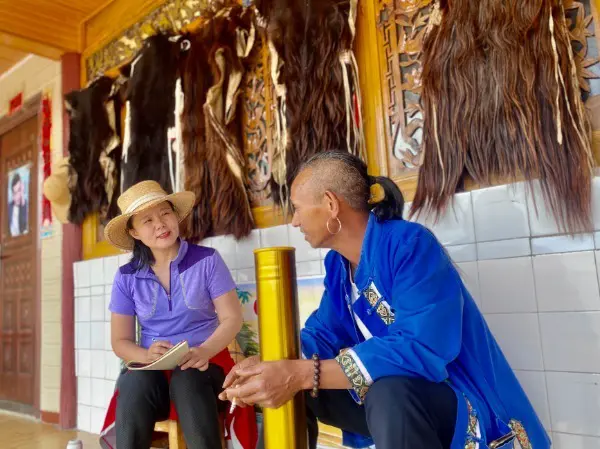Singer Gong Linna talks with 54-year-old performer Lu Chaojin.[Photo provided to China Daily]
Chinese singer Gong Linna has been forced to cancel or postpone all of her upcoming shows due to the coronavirus pandemic, including an April concert at Stanford University in the United States, which has been postponed until early 2021.
Since January, the singer has been staying at her home in Dali, Southwest China's Yunnan province, where she has had lots of time to read books and listen to music.
When she opened the book, Collection of Chinese Folk Music, written by professor He Yunfeng from the Central Conservatory of Music, Gong was intrigued.
The book, which introduces the history and culture of Chinese ethnic groups' music and collects nearly 600 songs of Chinese ethnic groups, inspired Gong to explore Chinese folk music.
"I bought the book about two years ago, but I was busy with touring and I didn't have enough time to read it. The viral outbreak has allowed me to slow down. When I read the book, listened to the folk songs and read the Mandarin translation of the lyrics, which are mostly performed in local dialects, I was so interested and I thought why not explore those folk songs by traveling to those villages mentioned in the book by myself?" says Gong, who was born in Guiyang, the capital of Southwest China's Guizhou province. She started learning Chinese folk singing at a very young age and enrolled at the Chinese Conservatory of Music in Beijing at the age of 16. She achieved fame in 2010 by performing the song, Tan Te, which was written by her husband, German composer Robert Zollitsch, better known among Chinese audiences as Lao Luo.

Local performer, 58-year-old Abenzhi, an inheritor of the intangible cultural heritage of tiaocai, a Yi ethnic dish-carrying folk dance, presents a performance in Nanjian Yi autonomous county, Yunnan province.[Photo provided to China Daily]
The couple has been devoted to promoting and popularizing Chinese folk songs, traditional musical instruments and traditional culture by releasing songs based on traditional poems and the 24 Solar Terms.
On March 26, Gong set out on her journey and her first stop was a small village in Midu, a county in the Dali Bai autonomous prefecture in western Yunnan province, where Xiao He Tang Shui (A Little Stream), one of the most well-known folk songs of China, was born.
In 2015, when China's first lady Peng Liyuan, once a renowned singer, visited the Juilliard School of performing arts in New York, soprano Liv Redpath performed the piece during a celebration gala.
After a two-hour drive through the mountainous area, Gong found 78-year-old Li Caifeng, a national-level inheritor of local folk songs, who performed the song for Gong in the local dialect. She told Gong that she has been singing the song since she was 7 years old. Li also performed other local folk songs, such as Hong Wawa, a lullaby which has been passed down for generations.
"It's much more important to make twists while singing than to reach high notes, since singing is like telling stories," Li told Gong.
"When she sang, her voice was like wind blowing in my face, fresh and soothing. I learned so much from her, which was beyond my expectation," recalls Gong.
During her trip to Midu, Gong also met 71-year-old Li Longying, a regional-level inheritor of intangible cultural heritage, who sings Huadeng Opera, and 77-year-old Li Shouchang, a veteran performer and composer of the opera form, who heads a local troupe.
 简体中文
简体中文

